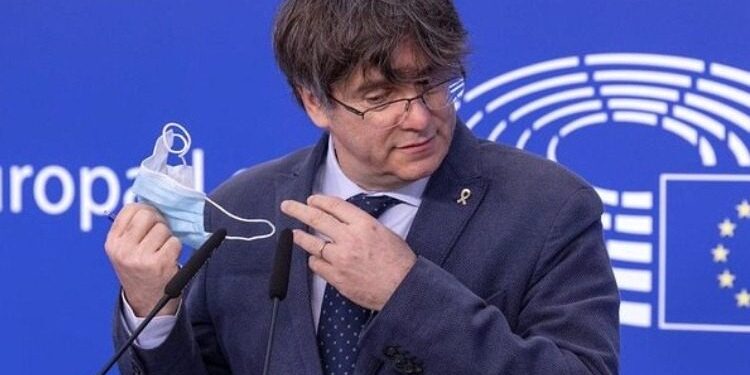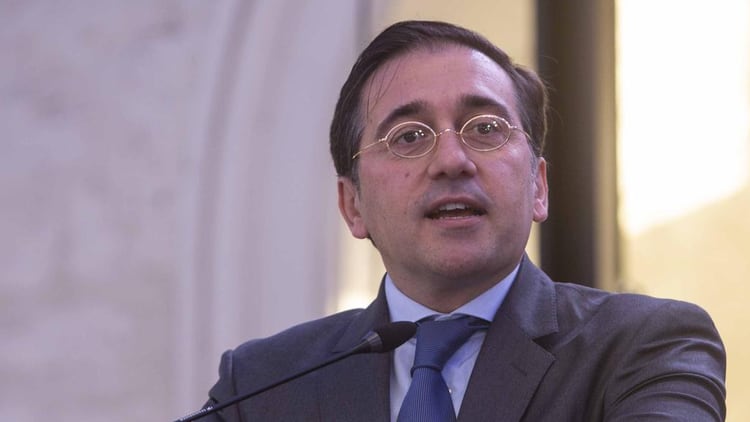Eduardo González
Today, the European Parliament will vote favorably on a resolution in which it will denounce the interference of the Russian security services in the independence process in Catalonia, will demand an investigation into the links between several MEPs, including the former president of the Generalitat Carles Puigdemont, and the Russian government of Vladimir Putin and will ask Spain to intensify and accelerate its investigations into Russia’s role in Catalan secessionism.
The text, agreed upon by the majority of the groups in the Chamber (from the popular to the socialists and the greens), indicates that “credible newspaper reports have for a long time highlighted contacts between secessionists in Catalonia and the Kremlin.” Some of these articles, the resolution continues, “showed that the former Russian diplomat Nikolai Sadovnikov met with former separatist leader and now MEP Carles Puigdemont in Barcelona on the eve of Catalonia’s illegal referendum in October 2017.”
Several “journalists involved,” the text continues, have revealed that “the autonomous community of Catalonia maintained contacts with high-ranking officials of Putin’s entourage with the aim of promoting a strategic alliance within the European Union” and that “the objective of such communications would have been to establish relations of political and economic influence if Catalonia had managed to unilaterally become independent from Spain.”
The ‘Voloh case’
Likewise, the resolution states that the Investigative Court number 1 of Barcelona, which is in charge of the investigation of the ‘Voloh case’, “which links, among others, the former president of Catalonia, Carles Puigdemont, and his entourage with Russia, recently extended the investigation for six months.”
The ‘Voloh case’ is the name of an investigation initiated in October 2020 by the Civil Guard into the alleged use of public funds for the organization of altercations related to the Catalan independence project. The investigation has been able to determine, from the intervention of the mobile phones of 18 people involved, that there were contacts between senior Catalan political officials, including Puigdemont, with Kremlin emissaries in Russia, among them the aforementioned Nikolai Sadovnikov (a man very close to Putin and his country’s Foreign Minister, Sergei Lavrov) and a certain Sergei Markov.
The investigation has even detected an alleged telephone conversation in which Víctor Terradellas, in charge of international relations at Convergència, claimed that the Kremlin had offered to send 10,000 Russian soldiers to Catalonia and pay all the Catalan debt if it declared independence and whether the Government officially recognized the annexation of Crimea as Russian territory. The Russian Government immediately denied all these accusations.
It asks Spain to intensify research
For all these reasons, the resolution indicates that the European Parliament “is extremely concerned about the relations between Catalan secessionists and the Russian administration”, pointing out that “Russian interference in Catalonia is part of a broader Russian strategy to promote internal destabilisation and EU disunity” and expresses its “deep concern about the massive disinformation campaigns that Russia has pursued in Catalonia, as well as the intense contacts and number of meetings between the agents responsible for Russian interference with the pro-independence movement and the regional government of the autonomous community of Catalonia.”
In short, the text agreed upon by the majority of the groups “calls on the competent Spanish authorities to continue, further intensify and swiftly conclude their investigations into the reported cases of interference by Russia, particularly those linked to Catalan secessionist groups” and deplores “the attacks on judges investigating these interference activities.”
The vice president of the European Commission, Margaritis Schinas, requested this past Tuesday in the plenary session of the European Parliament that the possible links between Catalan secessionist politicians and Putin’s Government be investigated. “It is the duty of this house to investigate who did what, under what conditions to play the Moscow game,” said the head of the Protection of the European Lifestyle during a debate in the European Parliament focused on Russian interference in democratic processes in Europe, which It was accompanied, precisely, by the presentation of the resolution that is going to be voted on today.







